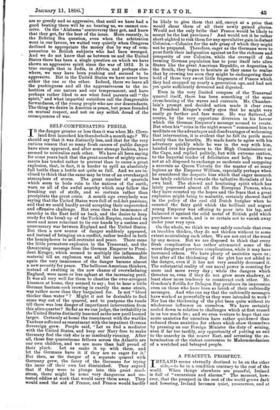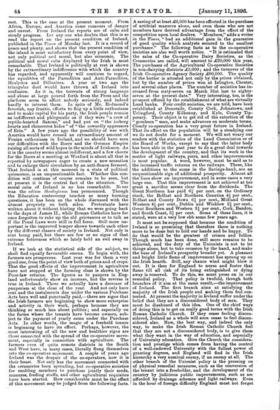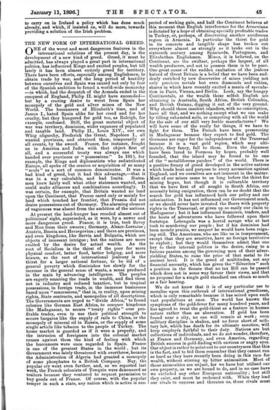A PEACEFUL PROSPECT.
IRELAND seems eternally destined to be on the other side,—to be in a condition contrary to the rest of the world. When things elsewhere are peaceful, Ireland is full of "excursions and alarms." The moment, how- ever, that the prospect in the rest of the world grows dark and lowering, Ireland becomes quiet, prosperous, and at rest. This is the case at the present moment. From Africa, Europe, and America come rumours of danger and unrest. From Ireland the reports are of calm and steady progress. Let any one who doubts that this is so read the report on the present condition of Ireland, published in the Times of Monday last. It is a record of peace and plenty, and shows that the present condition of the island is most satisfactory from every point of view, not only political and moral, but also economic. The political and moral calm displayed by the Irish is most remarkable. That Ireland is politically at rest is shown by the extraordinary indifference with which the country has regarded, and apparently will continue to regard, the squabbles of the Parnellites and Anti-Parnellites, Healyites and Dillonites. A year or two ago the triangular duel would have thrown all Ireland into confusion. As it is, the torrents of strong language and abuse at large poured forth from the Press and the platform seem to affect nobody seriously, and indeed hardly to interest them. In spite of Mr. Redmond's feverish, nay frantic, efforts to flog up a little enthusiasm and to make capital for his party, the Irish people remain as indifferent and phlegmatic as if they were " a crew of reptile-hearted Saxons," and had put on " the iceberg .hearts and rhinoceros hides " of " the cowardly oppressors of Erin." A few years ago the possibility of war with America would have roused an extraordinary amount of Fenian enthusiasm in Ireland, and we should have seen our difficulties with the Boers and the German Empire raising all sorts of wild hopes in the minds of Irishmen. As it is the country seems almost indifferent, and a few cheers for the Boers at a meeting at Wexford is about all that is reported by newspapers eager to create a new sensation and to enlarge their circulation by an anti-Saxon ferment. That Ireland is at this moment in a state of political quiescence, is an unquestionable fact. Whether this con- dition will continue of course remains to be seen, but at present it is the central fact of the situation. The moral calm of Ireland is no less remarkable. Ntver was the odium theologicum less pronounced. Though the Education controversy touches so many burning questions, it has been on the whole discussed with the utmost propriety on both sides. Protestants have written about it without hinting that we were going back to the days of James II., while Roman Catholics have for once forgotten to rake up the old grievances or to talk as if the Penal Laws were still in full force. Still more im- portant is the improved temper shown towards each other by the different classes of society in Ireland. Not only is rent being paid, but there are few or no signs of that extreme bitterness which so lately held an evil sway in Ireland.
If we look at the statistical side of the subject, we .shall find equally favourable omens. To begin with, the farmers are prosperous. Last year was for them a very good one, from the point of view both of prices and of crops. That the good effects of the improvement in agriculture have not stopped at the farming class is shown by the Poor-law returns. The figures as to paupers in Eng- land unfortunately show an increase, but the reverse is true in Ireland. There we actually have a decrease of pauperism at the close of the year. And not only have rent and the instalments due under the various Purchase .Acts been well and punctually paid,—there are signs that the Irish farmers are beginning to show more enterprise . and activity in their work, perhaps because they are thinking so much less about politics ; and especially on the farms where the tenants have become owners, sub- ject to the payment of yearly sums under the Purchase Acts. In other words, the magic of a freehold tenure is beginning to have its effect. Perhaps, however, the ‘most interesting of all the new and healthier signs are those connected with the spread of the co-operative move- anent, especially in connection with agriculture. The farmers even of quite remote districts in the South and West have, in many cases, literally flung themselves into the co-operative movement. A couple of years ago Ireland was the despair of the co-operators, now it is their boast. Not only has the movement connected with the creameries been spreading, but co-operative societies for enabling members to purchase jointly their seeds, manures, feeding stuffs, and other agricultural requisites have been started. How considerable must be the effect IA this movement may be judged from the following facts. A saving of at least £6,000 has been effected in the purchase of artificial manures alone, and even those who are not members have derived advantage from the effect of the competition upon local dealers. " Members," adds a writer in the Times, "had an additional gain in the guarantee of good quality which analysts secured to the smallest purchaser." The following facts as to the co-operative societies are also well worth notice. "It is estimated that the sales of the Co-operative Dairy Societies, as the Creameries are called, will amount to £20,000 this year, The purchases of the Agricultural Co-operative Societies in non-dairying districts £5,000; and the turnover of the Irish Co-operative Agency Society £80,000. The quality of the butter is attested not only by the prices obtained, but by the number of prizes won at Islington, Chester, and several other places. The number of societies has in- creased from sixty-seven on March 31st last to eighty- seven at the present date." Very interesting, too, is the prospect offered by the establishment of what are virtually Land banks. Four credit societies, we are told, have been established at Doneraile, County Cork, Johnstown, and Urlingford, County Kilkenny, and Kyle, County Tip- perary. Their object is to get rid of the extortion of the " gombeen " man, and make advances on moderate terms. Clearly co-operation has a very great future in Ireland. That its effect on the population will be a steadying one we do not doubt for a moment. We will not weary our readers with the statistics of the Land Commission or of the Board of Works, except to say that the latter body has been able in the past year to do a great deal towards the development of the country, and that its work in the matter of light railways, piers, and other improvements is most popular. A word, however, must be said as to the increased traffic returns on the railways. These, like the additions to the sums in the Savings-bank, are an unquestionable sign of additional prosperity. Almost all the lines show an improvement, and in some cases a very large one. That this improvement is not achieved at too great a sacrifice seems clear from the dividends. The Great Northern has paid 64 per cent. on the Ordinary stock, the Belfast and Northern Counties 41 per cent., Belfast and County Down 61 per cent., Midland Great Western 44 per cent. Dublin and Wicklow 24 per cent., Great Southern and cent., 34 per cent., Cork, Bandon, and South Coast, 34 per cent. Some of these lines, it is stated, were at a very low ebb some few years ago.
It must not be supposed that because the condition of Ireland is so promising that therefore there is nothing more to be done but to fold our hands and be happy. To do that would be the greatest of crimes and follies. Though much has been done, still more remains to be achieved, and the duty of the Unionists is not to let things alone, but to take occasion by the hand, and make the base of Ireland's prosperity broader yet. A pleasant and bright little flame of improvement has sprung up on the Irish hearth. Still, any chance wind might blow it out. It is then for England to nurse and foster that flame till all risk of its being extinguished or dying away is removed. To do this, we must press on in our remedial policy. That policy is twofold, though both branches of it aim at the same result,—the improvement of Ireland. The first branch aims at satisfying the majority of the Irish people and inaking them feel con- tented. At present the majority in Ireland suffer under the belief that they are a disconsidered body of men. They must be disabused of this idea. One of the chief ways of doing this is to get on really good terms with the Irish Roman Catholic Church. If they cease feeling discon- sidered, Ireland as a whole will soon cease to feel discon- sidered. also. Now, the best way, and indeed the only way, to make the Irish Roman Catholic Church feel that they are not a disconsidered body, is to give them what they want in the way of education, and especially of University education. Give the Church the considera- tion and prestige which comes from having the control of a well-endowed University with the fullest power of granting degrees, and England will find in the Irish hierarchy a very nominal enemy, if an enemy at all. The other branch of the Unionist policy is the pressing on of physical remedial measures, such as the conversion of the tenant into a freeholder, and the development of the country by judicious public improvements, such as are afforded by drainage schemes and light railways. Even in the hour of foreign difficulty England must not forget
to carry on in Ireland a, policy which has done much already, and which, if insisted on, will do more, towards providing a solution of the Irish problem.




































 Previous page
Previous page